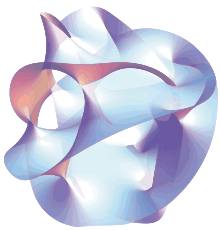
What’s interesting is why Horgan won and Kaku lost—and what Horgan expects to happen:
Below are the arguments that Kaku and I presented in 2002. In my argument I predicted that “over the next twenty years, fewer smart young physicists will be attracted to an endeavor that has vanishingly little hope of an empirical payoff.” I’m not sure we’ve reached that point yet. But I hold by my prediction that someday we will look back at the search for a unified theory as a “religious” rather than scientific quest, which never had any hope of being fulfilled…
[2002:] The dream of a unified theory, which some evangelists call a “theory of everything,” will never be entirely abandoned. But I predict that over the next twenty years, fewer smart young physicists will be attracted to an endeavor that has vanishingly little hope of an empirical payoff. Most physicists will come to accept that nature might not share our passion for unity. Physicists have already produced theories-Newtonian mechanics, quantum mechanics, general relativity, nonlinear dynamics–that work extraordinarily well in certain domains, and there is no reason why there should be a single theory that accounts for all the forces of nature. The quest for a unified theory will come to be seen not as a branch of science, which tells us about the real world, but as a kind of mathematical theology. By the way, I would be delighted to lose this bet.
John Horgan, “String Theory Does Not Win a Nobel, and I Win a Bet” at Scientific American
Aw come on! Delighted to lose the bet? That’s icing the cake way too thick, Horgan! 😉 Not fooling anybody, Horgan adds,
Postscript: This is the second Nobel-related bet I’ve won. In 1994 I bet physicist Michael Riordan a case of California wine that his Stanford colleague Andrei Linde would not win a Nobel Prize by the end of the century for his work on inflation, a theory of cosmic creation. Two decades later, inflation still hasn’t won a prize.
John Horgan, “String Theory Does Not Win a Nobel, and I Win a Bet” at Scientific American
He also refers us to skeptical Columbia mathematician Peter Woit, who says,
What shocks me about where we are now that Kaku and Kane have lost their bets is not that they lost, which was to be expected, but that this loss seems to have had zero effect on their behavior.
Peter Woit, “2019 Physics Nobel Prizes Announced, John Horgan Wins” at Not Even Wrong
That’s not really so surprising because string theory, cosmic inflation, and the multiverse they support were always tenets of a religion and it is validated principally by the meaning it gives to adherents’ lives.
It was perceptive of Horgan to sense that.
See also: Post-modern physics: String theory gets over the need for evidence
and
Cosmic inflation theory loses hangups about the scientific method
Follow UD News at Twitter!